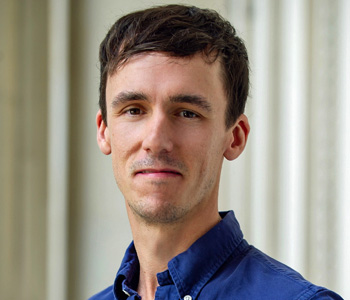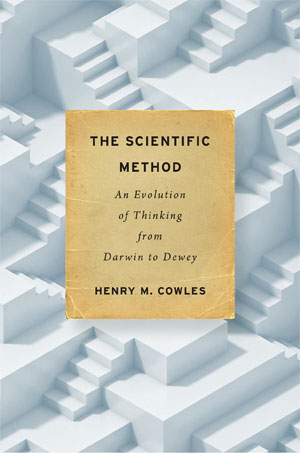
What the book is all about is right there in the title! Well, sort of.
The book isn’t about the scientific method—since it starts by pointing out that there’s no such thing. Scientists already know this: if you try to reduce science to a single set of steps, the result will either be too narrow (leaving out scientific fields that do things a bit differently) or too broad (including approaches that nobody thinks are scientific). Science is too big (and too diverse) to boil down to a method shared across specialties but limited to science alone.
What the book is about is the idea of a single, shared scientific method. Specifically, it offers a history of the five-step method that is still taught in classrooms around the world—anchored by asking a question and then testing hypothetical answers to it.
The historian of education, John Rudolph, has shown how these steps were copied into science textbooks from the work of John Dewey—with a twist. While Dewey saw his steps as something science shared with everyday thinking, others seized on them as a way to set science apart from other ways of knowing. The rest, as they say, is history.
I set out to see where Dewey’s steps came from. What I found was a nesting series of debates, from Dewey’s study of children and stretching backward through experiments on animals to the work of Charles Darwin almost a century earlier.
The story I tell in The Scientific Method is about how the lines between the human and natural worlds, and specifically between human and animal minds, got blurred over the nineteenth century. All this blurring led to Dewey’s search for a natural history of thinking, shared by any organism with a mind.
The fact that this project ultimately produced, in the hands of others, an account of human-specific scientific reasoning—and not the naturalistic project Dewey had planned—is ironic, if not tragic.
Relevance can be an accident. When I started working on this project in 2010, Naomi Oreskes and Erik Conway had just published Merchants of Doubt, their account of organized science deniers who attack everything from climate data to vaccine schedules. Little did I (or even they) know how much worse things were going to get over the next decade.
By the time I sat down to write the book, we had entered the age of “alternative facts”; and when it was published four years later, both the pandemic and QAnon were in full-swing.
The distrust and polarization we’re seeing in 2021—with conspiracy theorists in Congress and politicians running on internet rumors, rather than running away from them—makes the tight-knit world of Merchants of Doubt seem almost quaint.
If relevance can be accidental, it can also be regrettable. Like many people, I wish we weren’t in the middle of a crisis of expertise—but here we are.
As a kind of “pre-history” of the scientific method, my book can’t tell you when the scientific method is being invoked properly or how better to wield it. Instead, the book ends with a question: what if pointing to a special method as the guarantor of scientific expertise is doing more harm than good?
The book hints at an answer by describing a different path. Most of the scientists I write about were interested in how science shades imperceptibly into other kinds of problem-solving. Their work didn’t lead to cynical conclusions about trust or truth, however. It simply insisted that science was a part of the world, an elaborate version of something that should be familiar to everyone.
Or at least, that was the idea.
In the end, as the book shows, that wasn’t the model of science and science’s publics that took shape in the twentieth century. For better and for worse, science came to seem like something that happened behind closed doors.
Distance has its benefits, especially when the process needs to be shielded from interference. But I argue that distance has its downsides, too. Most people don’t know how science actually gets done, which puts a premium on both media representations and the idea of a single method. What would happen if we closed the gap a little?
I think a lot of these points come together in Chapter 6, which is called “Animal Intelligence.” The title gives a pretty good sense of what’s in there: scientists trying to figure out how all kinds of non-human animals learn to solve problems and navigate their environments.
Aside from the fascinating stories, the chapter will give readers a window onto how far afield these debates about method really got. Because it shouldn’t be obvious that someone studying a rat in a maze is also, at the same time, thinking carefully about the foundations of science. But that’s the story, that’s what they were doing.
Working within the framework of Darwin’s theory of evolution by natural selection, the founders of what was called “comparative psychology” at the time were convinced that you could explain even the highest levels of cognition by appealing to an evolutionary process. And if you believe that, then there’s a story to tell connecting the rat in the maze to the scientist studying that rat. Both of them are, in some sense, engaging in an experimental procedure based in trial and error.
Of course, there’s a difference between what rats do when they hunt for cheese and what scientists do when they write on their clipboards. A big difference. But the fact that it’s a difference of degree, rather than kind, really mattered to these psychologists.
Seeing the roots of your own method “out there” in other animals started to naturalize that method. Comparative psychologists could appeal to this natural history of method as a way to say “See—I’m solving problems in my field the way they’re meant to be solved!”
Like I said, there are problems with this approach. Taken too far, it implies that a rat or a kid or a politically motivated skeptic has as much authority as a trained scientist.
But we don’t have to take it that far. In the next chapter, on the application of these ideas in schools, we see how this inclusive approach to scientific thinking got translated into a successful curriculum that’s still being used in science education today.
However, this approach got shorn of its context. Once it started moving around without the natural history that buttressed it, that’s when we start to see this idea of “the scientific method” emerge as science’s brand, as a way to separate it from society.
History has a lot to teach us. We know that. The hard part is making the leap from past to present, or more generally from “is” to “ought.”
One way to use history is as a map of paths not taken. I think that’s the most obvious implication of the book: it shows what a generation of scientists thought they were doing by reflecting on method by studying other minds—before their work was taken in a different direction. If we go back to their original vision, we might find some lessons for shoring up expertise today.
There are other implications I wish I’d brought out more explicitly in the book. One has to do with politics. The move to naturalize science paved the way for insisting that it was apolitical. This idea has been used (unsuccessfully, in many cases) to shield science from politics.
But as I show in Chapter 2, this research program actually began with politics—specifically, with the desire to define science as both radical and conservative. Science, in this view, encompasses politics. If we thought of it that way today, we might have different strategies for building trust in it.
The other implication that’s mostly latent in the book has to do with objectivity. Attempting to find a least common denominator for science, something so general you could find it in any animal, these scientists framed it as an objective tool—usable in any context, on any problem.
But there’s another way to think about objectivity, one that builds our identities into science, rather than separating them out. Feminist arguments for “Strong Objectivity” or what Donna Haraway has called “situated knowledges,” adopt this view—and it has immense potential for repairing our sense of science as a human activity, as something we do together, fallibly.
I’m drawn to this view of objectivity, and I think some of the figures in my book would’ve been too. One of them, William James, was actually the source of my epigraph. I think it makes as much sense as a conclusion as it did as an opening: “Theories thus become instruments, not answers to enigmas, in which we can rest. We don’t lie back upon them, we move forward, and, on occasion, make nature over again by their aid.”


Henry M. Cowles teaches at the University of Michigan. A scholar of the history of science and medicine, he has written on evolutionary theory, animal psychology, and efforts to combat extinction. His research explores how the human sciences shape our perceptions of agency, possibility, and progress.